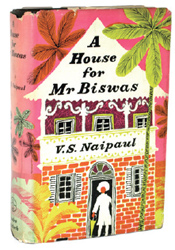|
September 2015

Issue Home >>
|

 All thirty of VS Naipaul’s books and his hundreds of articles and interviews would take up considerable space on a library shelf. Add in some of the critical work on his oeuvre, then a one-room-four-wall shelved space usually allocated to a personal library would be occupied solely by VS Naipaul along with work pertaining to his writing. All thirty of VS Naipaul’s books and his hundreds of articles and interviews would take up considerable space on a library shelf. Add in some of the critical work on his oeuvre, then a one-room-four-wall shelved space usually allocated to a personal library would be occupied solely by VS Naipaul along with work pertaining to his writing.
If, you consider “the writer is worth reading slowly,” and you read like VS Naipaul, then you have been reading for a long time, for he says: “I would like to read only 20 pages a day – to read more is to throw away lovely things” (Interview with John Baker, Publishers Weekly 6 June 1994, 44-46). You would, however, have certainly found the spatio-temporal investment worth your while, especially if you read his words – carefully crafted, as he tells us in the Foreword to A House for Mr Biswas, at the rate of approximately 400 words a day – like he does, and particularly if you obtain the kind of enlightenment I have.
Illumination comes in a variety of ways. It inheres in the models of precision and clarity the writing provides, quite frequently on issues that reader as well as author harbour ambiguous, ambivalent views and emotions, and for which therefore only the most subtle techniques of caricature, parody, irony and resultant humour are suitable. We can think for example of the well-loved works of the youthful writer: Miguel Street (1959 – written first; published later), The Mystic Masseur (1957), (adapted for the Merchant-Ivory film script by Caryl Phillips), The Suffrage of Elvira (1958) and A House for Mr Biswas (1961). But the description also applies to the portraits of the British working class in Mr Stone and the Knights Companion (1963), the Black Power movement captured in Guerrillas (1975), and of Willie Chandran’s ostensibly revolutionary endeavours in his journeys across Africa, India and Europe in Half a Life (2001) and Magic Seeds (2004).
One also gains a special kind of socio-cultural and historical awareness through VS Naipaul’s journalistic techniques, from which many a journalist could learn. This is most evident through the nine books comprising the Latin American-Caribbean, Indian and Islamic-Middle Eastern trilogies: The Middle Passage (1962), The Loss of El Dorado (1969), and The Return of Eva Peron with the Killings in Trinidad (1980); An Area of Darkness (1964), India: A Wounded Civilization (1976) and India: A Million Mutinies Now (1990); The Overcrowded Barracoon (1972), Among the Believers: An Islamic Journey (1981) and Beyond Belief: Islamic Excursions Among the Converted Peoples (1998) as well as the three comprising reflections on Africa in one of the narratives in Finding the Centre: Two Narratives (1984) and the recent Masque of Africa (2010) and on the United States in A Turn in the South (1989).
These books model not only a writing style but an attitude to life of courage and detachment. Equally importantly, the acumen the work yields has to do with the development of a keen grasp of human psychology especially with regard to lust for power and pleasure and the abyss between desire and its object. For many ardent Naipaul fans, this assertion will immediately bring to mind the political Caribbean novels The Mimic Men (1967) and A Flag on the Island (1967) as well as the earliest and most penetrating analyses of the postcolonial condition in the collection of stories In a Free State (1971) and the novel A Bend in the River (1979). Finally, (only because to do otherwise is to exceed my word limit), there is a philosophical education from becoming immersed in the hybrid works The Enigma of Arrival (1987) and A Way in the World (1994) and the most recent collections of essays.
From the little said here, it should be possible to glimpse why V. S. Naipaul echoes his father and brother to insist on the nobility of the writer’s calling. As he said to Tarun Tejpal: “It is the only noble calling. It’s noble because it deals with the truth” (Random Magazine June 1998).
The Department of Literary, Cultural and Communication Studies in the Faculty of Humanities and Education at the St Augustine Campus joins with the Friends of Mr Biswas to host a conference, Seepersad & Sons: Naipaulian Creative Synergies, October 28-30.
Dr J. Vijay Maharaj is a cultural and literary analyst who works in the Department of Literary, Cultural and Communication Studies. |





